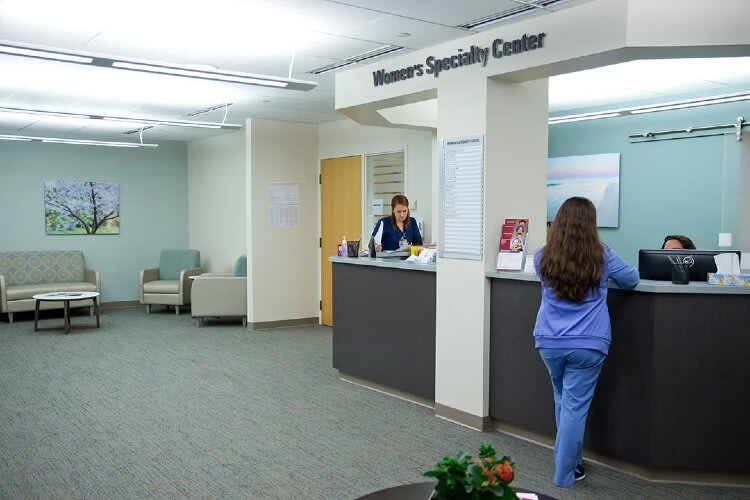Genetic Health Program For Men & Women
Stamford Health’s Comprehensive Center for BRCA & Genetic Health provides support for men and women, whether you know you have a genetic mutation or are interested in pursuing genetic testing. Inheriting a genetic mutation like BRCA1, BRCA2, or other related genes, leads to an increased risk of cancers like breast, ovarian, pancreatic, and prostate.
Understanding and navigating a genetic mutation can be overwhelming. Our team brings together experts in genetics, gastroenterology, gynecologic oncology, endocrinology, and other fields to interpret complex genetic information, so you receive extensive insight and a personalized plan to help you understand your specific situation for long-term health and well-being.
Experts at the Women’s Specialty Center, Breast Center, and Carl & Dorothy Bennett Cancer Center will provide you with a tailored risk assessment, recommendations, and support. Our providers will explain what the findings and choices mean for you and your family and answer your questions. We will help you decide which options best meet your needs.
What To Expect From The Comprehensive Center For BRCA & Genetic Health
Dr. Sarah Cate, Stamford Health’s Chief of Breast Surgery, provides an overview of the program and what patients can expect. Understanding your family history and overall genetic health can help you make informed decisions in conjunction with Stamford Health’s expert team. Watch the video to learn more.
Risk Factors for BRCA1, BRCA2, & Related Genes
There is no wrong time to pursue genetic testing, though if you have any of the highlighted risk factors below it could indicate an increased likelihood of a BRCA gene mutation, and you may want to pursue testing sooner.
What To Expect Next
Our Collaboration With Dana-Farber Brigham Cancer Center Provides More Resources for Patients
Stamford Health’s comprehensive, ongoing collaboration with Dana-Farber Brigham Cancer Center ensures that our patients receive world-class, clinical expertise close to home. Stamford Health physicians work together with Dana-Farber Brigham physicians, including on weekly tumor board sessions for case review, to offer timely second opinions and allow access to the latest research, treatment options, and clinical trials. For more information on how this unique relationship helps our patients, watch the video.
FAQs About BRCA & Genetic Health
-
WHAT DOES BRCA STAND FOR?BRCA stands for "BReast CAncer susceptibility gene." There are two main types, BRCA1 and BRCA2. Both genes help repair cell damage and keep breast, ovarian, and other cells growing normally. However, inherited mutations in these genes can significantly increase the risk of developing breast, ovarian, and other types of cancer. Inherited BRCA mutations are passed down from one generation to the next, making it important for individuals with a family history of these cancers to consider genetic testing. It is important to note that both men and women can inherit these gene mutations.
-
HOW DO YOU KNOW IF YOU QUALIFY FOR BRCA TESTING?You might qualify for BRCA testing if you have a personal or family history of breast, ovarian, pancreatic, or prostate cancer, especially at a young age, or if any family member has a known BRCA mutation. Stamford Health offers a genetic risk assessment to help determine if you should undergo genetic testing based on your medical and family history.
-
DOES STAMFORD HEALTH OFFER TESTING FOR GENETIC MUTATIONS OTHER THAN BRCA?In addition to BRCA1 and BRCA2, we test for mutations in genes such as PALB2, CHEK2, Lynch Syndrome (MLH1, MSH2, MSG6, PMS2, EPCAM), CDH, BRIP1, RAD51C, ATM, TP53 (associated with Li-Fraumeni Syndrome), and many others. These genes can indicate an increased risk of various cancers, including breast, ovarian, colorectal, and pancreatic cancers, among others. Understanding these mutations helps us guide you through personalized preventive measures and treatment options.
-
DOES INSURANCE COVER GENETIC TESTING?Many insurance plans cover genetic testing, especially when it is recommended due to a personal or family history of cancer. Coverage can vary, so it's important to verify with your insurance provider. Stamford Health's financial counselors can assist you with understanding your coverage and any potential out-of-pocket costs.
-
WHAT SHOULD YOU DO IF YOU DON’T KNOW YOUR FAMILY HISTORY?If you don’t know your family history, genetic testing can be a valuable tool to evaluate your genetic health risks. Discussing your personal health history and any symptoms related to cancer with a genetic counselor at Stamford Health can provide crucial guidance. Genetic testing may be particularly beneficial for uncovering inherited risks and planning appropriate preventive measures, even when family medical history is not available.
-
WILL YOU REVIEW THE RESULTS FROM A MAIL-ORDER GENETIC TEST?Yes, our genetic specialists at Stamford Health can review and interpret results from mail-order genetic tests, including popular services like 23andMe, Ancestry, or other genetic test providers. We encourage you to bring these test results to your initial appointment with a genetic counselor. Many times, testing needs to be repeated if it is not done via a certified laboratory. This does not impact insurance coverage. While these tests can provide valuable insights into your genetic makeup, it's important to have them reviewed by health care professionals. Our team can help you understand the implications of your results in the context of your overall health and medical history, discuss potential health risks, and recommend any further testing or preventive measures that might be necessary based on a comprehensive assessment.








